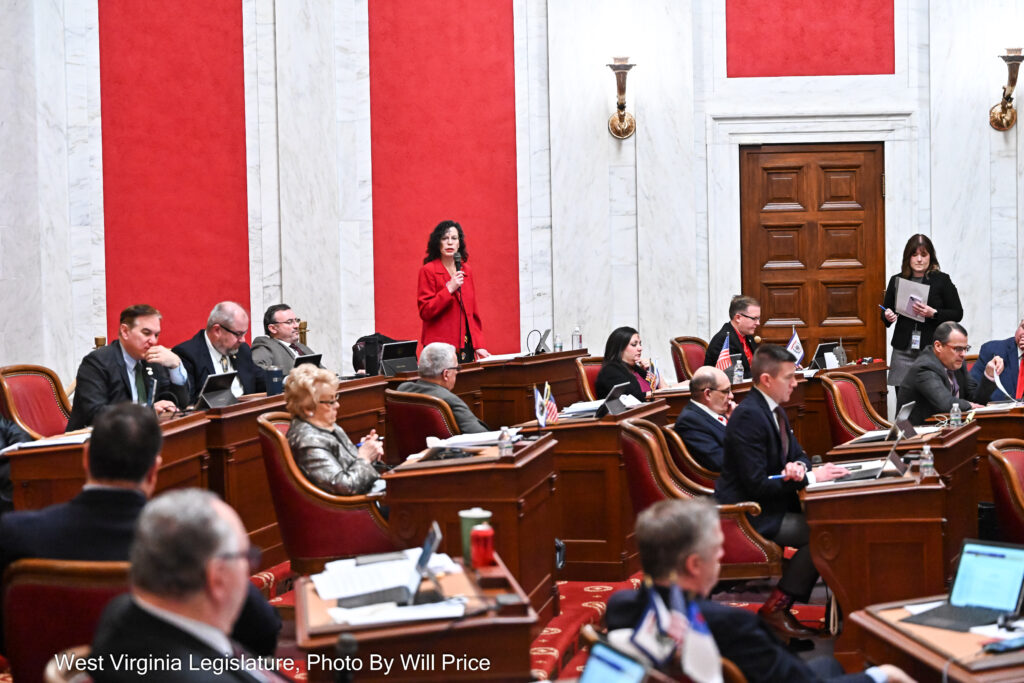BY: LORI KERSEY
Under a bill the state Senate passed Wednesday, doctors performing abortions in West Virginia would have to tell their patients about “perinatal hospice services” and medication abortion reversal, a controversial claim that people who change their mind after taking an abortion pill can take another medication to continue the pregnancy.
Abortion is illegal in West Virginia with some exceptions, including in the case of nonviable pregnancies, medical emergencies, and in some cases if the pregnancy was the result of a sexual assault or incest.
Senate Bill 352 modifies the so-called “Unborn Protection Act” and requires that in cases of legal abortions, the medical provider informs the person getting the abortion of the medical risks associated with the procedure and with carrying the child to term, the opportunity to view an ultrasound, and the probable age of the fetus or embryo.
The bill also requires the provider to tell the patient of “perinatal hospice services” available and in the case of medical abortions, the risks associated and information about reversing medication abortion.
Medication or medical abortion ends an early pregnancy with a combination of the drugs mifepristone and misoprostol. Anti-abortion groups say taking progesterone after the first pill can reverse medication abortions.
According to the American College of Obstetricians and Gynecologists, claims about reversing abortion are not based on science and do not meet clinical standards.
“Despite this, in states across the country, politicians are advancing legislation to require physicians to recite a script that a medication abortion can be ‘reversed’ with doses of progesterone, to cause confusion and perpetuate stigma, and to steer women to this unproven medical approach,” a note on ACOG’s website says. “Unfounded legislative mandates like this one represent dangerous political interference and compromise patient care and safety.”
The bill passed the Senate with a vote of 32 to 1. Sen. Mike Caputo, D-Marion was the lone no vote. Caputo said he had received a letter from a doctor, whom he didn’t name, that gave him pause about the bill.
Reading from the letter, Caputo called the bill dangerous and outside the mainstream. Organizations representing thousands of clinicians oppose bills that put lawmakers in the position of interfering with how health care is provided, the letter said.
The bill’s lead sponsor Sen. Patricia Rucker, R-Jefferson, said the bill does not expand the abortion ban in the state law or increase penalties.
“All this does, and I cannot imagine anyone would oppose, is make certain that the woman has all the information she should have in making a decision,” Rucker said.
Margaret Chapman Pomponio, executive director of the reproductive rights group WV Free, said the bill is “not just unnecessary, it’s harmful.”
“Again we see politicians trying to play doctor,” Chapman Pomponio said. “And it requires health care professionals to deceive their patients. Getting informed consent before any medical procedure is required. And so, for that reason it’s certainly unnecessary, but they want the bill because they want to force providers to provide inaccurate information.”
Perinatal hospice services are described as a “model of support for parents who choose to continue their pregnancies following a prenatal diagnosis indicating that their baby has a life-limiting condition and might die before or shortly after birth.”
A website outlining the services says two such programs exist in West Virginia: the Maternal-Fetal Medicine Division of West Virginia University-Charleston at Charleston Area Medical Center, and the West Virginia University Children’s Hospital.
Chapman Pomponio called perinatal hospice “way outside the mainstream of obstetrics and gynecology.”
“It’s just another sad attempt to force junk medicine on our health care professionals, who are already quite frankly overwhelmed by legislative overreach into the practice of medicine,” she said.
The bill now heads to the House.

